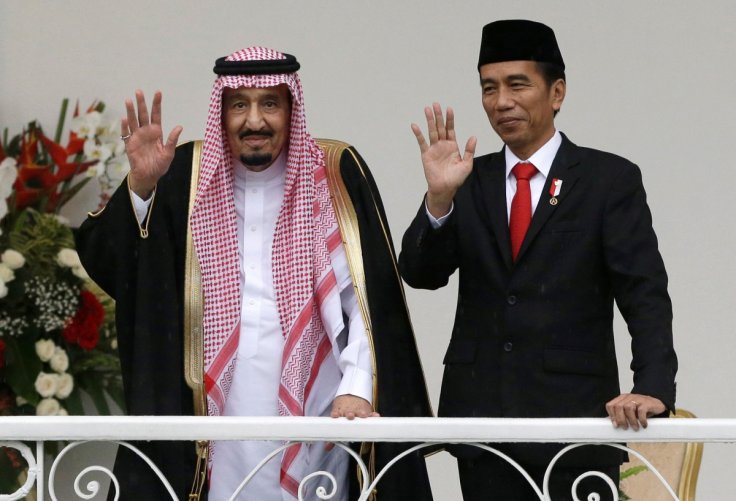With around 2,795 cases of infection as on April 8, Saudi Arabia has the highest number of confirmed COVID-19 cases in the Gulf region, but the kingdom worries that if measures that it has put in place to counter the disease are not followed, that number could swell to 200,000 in the coming weeks.
The kingdom has also said that it would take four months or up to a year to contain the coronavirus disease. The announcements were made by Saudi Health Minister Dr Tawfiq Al Rabiah during a press briefing on Tuesday, April 7.
Studies predict Saudi COVID-19 infection could reach 200,000

"Within the next few weeks, studies predict the number of infections will range from a minimum of 10,000 to a maximum of 200,000," the Saudi Press Agency cited health minister Al-Rabiah as saying.
The Ministry of Health also confirmed that three more people had died of coronavirus and that the total number of confirmed cases in the kingdom rose to 2,795. The death toll so far climbed to 41, while the total number of recovered patients is 615, Al Rabiah said.
Highest number of COVID-19 cases in the GCC
Saudi Arabia is home to some 30 million inhabitants and the numbers of COVID-19 infections and deaths are the highest in the Gulf Cooperation Council (GCC) countries which comprises of six Arab nations, including Bahrain, Kuwait, Qatar, Oman and Saudi Arabia and the UAE.
This is despite the kingdom's halting all passenger flights to and from the country, suspending most commercial activities and restricting internal movements and imposing 24-hour curfews in major cities including capital Riyadh, Mecca, Medina and Jeddah.
Saudis are not taking coronavirus seriously
The health minister noted that some people in the kingdom aren't taking the coronavirus issue seriously and have failed to adhere to the coronavirus measures in place such as the ban on social-gatherings and social distancing.
Holding people's non-compliance with the precautionary measures as the main reason behind the rise in COVID-19 infections, minister Al Rabiah warmed that the rise in coronavirus infection "may reach a level that may overpass the capacity of the kingdom's health sector."
"We stand today at a decisive moment as a society in raising our sense of responsibility and contributing together with determination to stop the spread of this pandemic," the Health Minister said in a televised address urging people to take the matter seriously.
Al Rabiah suggests that keeping the infections at the current rate for the next four to 12 months would give the kingdom enough time to prepare and prevent it from overwhelming the health system as it has in other countries.
King Salman allocates 7 billion riyals for COVID-19 prevention
The King Salman bin Abdulaziz has approved another seven billion Saudi Riyals (approximately $1.86 billion) for the health ministry to combat the COVID-19 pandemic and has promised to allocate another 32 billion riyals before the end of the year. The health minister ensures that the kingdom is sparing no effort to meet the budget allocations to deal with COVID-19 crisis.
How is Saudi dealing with coronavirus
Meanwhile, on Monday, April 6 the kingdom decided to extend the duration of daily curfews in four governorates and five cites to 24 hours. The health minister said the 24-hour curfews, imposed on the night of April 6 were needed because some of the people were not taking the consequences of infection seriously and we're leaving their homes and gathering in groups. But despite the warnings and restrictions to internal movement, passenger road traffic had barely fallen by 50 percent, the minister said.
The interior ministry tweeted that it had imposed round-the-clock lockdowns in the capital Riyadh, and in the cities of Tabuk, Dammam, Dhahran, and Hofuf. The same measures are also being imposed in the governorates of Jeddah, Taif, Qatif and Al-Khobar.
The holy cities of Mecca and Medina have already been sealed off, and authorities have barred people from entering and exiting the cities as well as banning the entry of pilgrims to the holy mosques.
Hajj and Umrah
Saudi Arabia suspended the year-round Umrah pilgrimage over feats of the coronavirus pandemic spreading to the Muslim holy cities. The Minister of Hajj and Umrah Muhammad Saleh Banten urged Muslims to temporarily defer their preparations for the annual pilgrimage that is to take place in July-end until there is more clarity on the coronavirus pandemic.
The authorities are getting to announce whether they will proceed with this year's Hajj. The Hajj pilgrimage which is undertaken by some 2.5 million Muslims from around the world is the kingdom's second-biggest source of income after oil and gas.
A more difficult ahead
Saudi Arabia which is the biggest economy in the Arab world has also closed down most commercial activities and shuttered down cinemas, malls and restaurants and halted all international flights in an effort to contain the virus.
Saudi King Salman bin Abdul Aziz has warned of a "more difficult' fight ahead, as the kingdom faces an economic blow due to the virus-related shutdowns and crashing oil prices.








